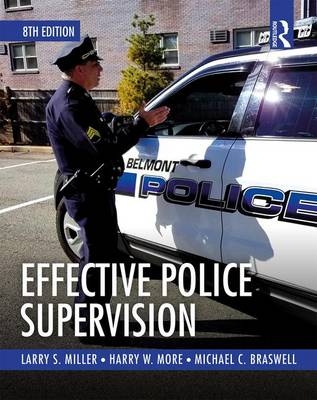
Effective Police Supervision
Routledge (Verlag)
978-1-138-22518-3 (ISBN)
- Titel erscheint in neuer Auflage
- Artikel merken
Larry S. Miller is a Professor in the Department of Criminal Justice and Criminology at East Tennessee State University. A former law enforcement officer and crime laboratory director, Miller has authored or co-authored seven textbooks, including Police Photography, Crime Scene Investigation, Report Writing for Criminal Justice Professionals, and Effective Police Supervision. His research interests and journal publications are in the areas of policing and forensic science. Harry W. More was a Professor Emeritus at San Jose State University, and a past president of the Academy of Criminal Justice Sciences and the Western Society of Criminology. He taught at Washington State University; Indiana University of Pennsylvania, where he founded and chaired the Criminology program; and San Jose State University, where he chaired the Department of Administration of Justice. Outside of the university setting, he was employed by the U.S. Secret Service, worked in juvenile probation, and taught in-service management personnel in California, Ohio, and Oregon. At the time of his death, he was the President of the Law Enforcement Consulting Group, and had written numerous articles and authored or edited more than 40 texts. Michael Braswell is Professor Emeritus at East Tennessee State University. He began his career as a prison psychologist and earned his Doctorate in Counseling Psychology from the University of Southern Mississippi in 1975. He joined the Department of Criminal Justice and Criminology at ETSU in 1977, where he taught classes on Ethics and Justice, Human Relations and Criminal Justice, and Film Studies in Crime and Justice. He is widely published, and his textbook Justice, Crime, and Ethics is particularly influential in the field of criminal justice.
List of Figures
List of Case Studies
Preface
1 Supervision—The Management Task
Transformation
The Need for Accountability Management
Definition of Accountability
Vital Characteristics of Accountability
Five Levels of Accountability
Supervisory Skills Areas (Hu-TACK)
Self-Appraisal
Management Expectations of the Supervisor
Subordinates’ Expectations of the Supervisor
Peer Expectations of the Supervisor
References
2 Community-Oriented Policing and Problem Solving—Improving Neighborhood Quality of Life
Definition
Empowerment
Quality Supervision
Process Facilitation
Building Partnerships Within the Police Department
Identifying Stakeholders
Supervising Community Police Officers
References
3 Interpersonal Communications—Striving for Effectiveness
The Importance of Communication Skills
The Communication Process
Communication Patterns
Barriers to Communication
Overcoming Communication Barriers
Feedback
The Art of Listening
Nonverbal Communications
Communicating with Limited English Proficiency Individuals
Intercultural Communications
Communicating with Hearing-Impaired Individuals
References
4 Motivation—A Prerequisite for Success
Why Officers Work
Motivation
Needs-Based Motivation
Motivation–Hygiene Theory
Expectancy Theory
Equity Theory
Sensitivity Theory
How to Motivate
References
5 Leadership—The Integrative Variable
Power
Theories of Leadership
Leadership Continuum
Supervisory Styles
Leadership Mistakes
References
6 Team Building—Maximizing the Group Process
The Individual
The Individual and the Group
Role and Function of the Group
Group Development Process
Group Norms
The Group Process
Group Problem Solving
Conducting Meetings
Groupthink
References
7 Change—Coping with Organizational Life
Factors that Foster Change
Positive Aspects of Change
Accepting Change
Resistance to Change
The Nature of Resistance
Working for Change
References
8 Performance Appraisal—The Key to Police Personnel Development
People Power
Performance Appraisal
The Human Factor
The Validity and Reliability of Performance Appraisal
The Evaluation Interview
Trends in Performance Appraisals
References
9 Training, Coaching, Counseling, and Mentoring—Helping Officers Grow and Develop
Teaching Officers
Formal Training
Civil Liability for Failure to Train Police Personnel
The Police Sergeant’s Role as a Trainer
Coaching, Counseling, and Mentoring
Characteristics of an Effective Coach
Principles of Coaching/Counseling/Mentoring
The Supervisor as a Developmental Coach, Counselor, Mentor
Developmental Counseling
The Counseling Process
Mentoring
References
10 Discipline—An Essential Element of Police Supervision
The Nature of Discipline
Discipline in the Ranks
Positive Discipline
Negative Discipline
Sergeants as Disciplinarians
Fair and Equitable Discipline
The Use and Abuse of Discipline
Keys to Effective Discipline
The Hot Stove Revisited
Firm but Fair Disciplinary Action
Types of Disciplinary Actions
Making the Disciplinary Action Stick
Constructive Discharge
Results of Absent Discipline
Personal and Vicarious Liability
References
11 Internal Discipline—A System of Accountability
Police Work
Controlling the Police
Personnel Complaint Investigation Policy
Dealing with Police Occupational Deviance
Social Media Concerns
Personnel Complaints
The Civilian Review Movement
Forecasting and Dealing with Potential Disciplinary Problems
Discipline and the Employee Assistance Movement
References
12 Supervising the Difficult Employee—Special Considerations
Value Statements
Employees as Individuals
Types of Employees
Problem Employees
Millennial Generation
Work Stressors
Personal Problems
Early Warning Systems
Employee Assistance Programs
Critical-Incident Stress Management
Peer Counseling
Fitness-for-Duty Evaluations
References
13 Supervising Minorities—Respecting Individual and Cultural Differences
Coming to Grips with the Past
The Changing Face of America
Supervising Minorities
Dealing with Employees in a Protected Class
Handling Sexual Harassment in the Workplace
Supervising Sexual-Minority Police Officers
Managing a More Educated Workforce
Training for the New Supervisor
References
14 Tactical Operations—Critical Incident Deployment
Critical Incidents
Incident Command System
Role of the First-Line Supervisor in Critical Incidents
Critical Incident Management
Supervisory Span of Control
Tactical Teams
Critical Incident Debriefing
SWAT—Special Weapons and Tactics
Militarization of the Police
References
15 Labor Relations—Problem Solving through Constructive Conflict
Sowing the Seeds of Unionism
Management Rights
Understanding Labor Relations
Selecting a Bargaining Agent
Collective Bargaining
Union Goals
Dealing with Grievances
Impasse Resolution Through Job Actions
Union–Management Relations
Contract Administration
Role of the Sergeant in Collective Bargaining
Interest-Based Bargaining Process
References
16 Homeland Security and Terrorism—A Changing Role
The Nature of Terrorism
Domestic Terrorism
Foreign Terrorism
American Response to Terrorism
Local Response to Terrorism
Information Versus Intelligence
Identifying Potential Terrorist Targets
Police Supervisor’s Role
References
Name Index
Subject Index
| Erscheinungsdatum | 28.05.2017 |
|---|---|
| Zusatzinfo | Following "Community Policing" (9780323340496) amended to 1 colour; 17 Line drawings, black and white; 22 Tables, black and white; 17 Illustrations, black and white |
| Verlagsort | London |
| Sprache | englisch |
| Gewicht | 1111 g |
| Themenwelt | Recht / Steuern ► Strafrecht ► Kriminologie |
| Sozialwissenschaften ► Soziologie | |
| Wirtschaft ► Betriebswirtschaft / Management ► Personalwesen | |
| ISBN-10 | 1-138-22518-5 / 1138225185 |
| ISBN-13 | 978-1-138-22518-3 / 9781138225183 |
| Zustand | Neuware |
| Informationen gemäß Produktsicherheitsverordnung (GPSR) | |
| Haben Sie eine Frage zum Produkt? |
aus dem Bereich



